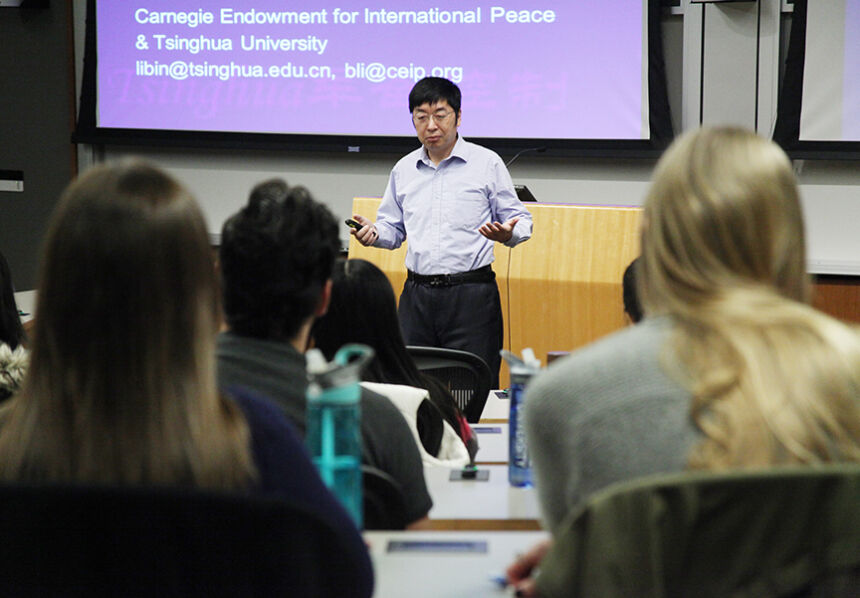January 29, 2016
China national security expert speaks to SIA students

UNIVERSITY PARK, Pa. -- Li Bin, a senior associate working jointly in the Nuclear Policy Program and Asia Program at the Carnegie Endowment for International Peace, presented a talk on China's security thinking as part of the Penn State School of International Affairs’ spring colloquium: Current Policy Challenges (INTAF 590).
SIA students listened to Bin explain Chinese national security viewpoints, starting with how the U.S. thinks of security and safety as two different categories. However, in China, Bin said, the two concepts are joined together as the Chinese word for “security” encompasses the meaning of “safety,” and therefore shapes the Chinese national security strategy. What this means is that China’s security theory treats military and nonmilitary security issues with the same level of importance.
The difference between the two countries continues with the issue of nuclear weapons. Bin maintained that the U.S. has an offensive view of nuclear weapons, while China sees nuclear weapons as a defensive tactic.
“China employs a ‘first use doctrine,’ which means they will only use nuclear defense if first attacked,” Bin said. “The Chinese have a nuclear taboo against the use of nuclear weapons, which is socially ingrained.”
Bin further explained that the Chinese want to develop defensive weapons to compensate for the belief that they are technically lagging behind the United States. China’s strategic and nuclear projects aim to master the defense technologies, but not to deploy them.
"Professor Bin’s talk about the differences in approaches between the United States and China regarding nuclear weapons, security, and safety, and how these discrepancies may actually have come about because of the meaning that each word carries in the two languages, was informative in learning about China’s national security outlook,” said SIA student Kelly Diaz. “It was a new perspective for me to learn about this from a multidisciplinary specialist who looked at a major historical and contemporary international issue from a physics, political science, and linguistic standpoint."
Bin, a physicist and expert on nuclear disarmament, focuses his research on China’s nuclear and arms control policy and on U.S.-Chinese nuclear relations.
He is a professor of international relations at Tsinghua University in Beijing. He previously directed the arms control division at the Institute of Applied Physics and Computational Mathematics, where he also served as executive director of the Program for Science and National Security Studies. Bin was also a Social Science Research Council–MacArthur Foundation Peace and Security Fellow at the Massachusetts Institute of Technology and Princeton University.
Professor and retired U.S. Ambassador Dennis Jett organizes the semester-long colloquium to bring to SIA thought leaders on topics ranging from food security to terrorism. This year, the program features 16 speakers. Colloquium topics vary depending on the current issues of the day. The course surveys some major transnational social problems confronting the world, suggested by the Copenhagen Consensus, such as: climate change; communicable diseases; conflict and arms proliferation; access to education; financial instability; governance and corruption; malnutrition and hunger; migration; sanitation and access to clean water; and subsidies and trade barriers. The course involves team teaching and guest lecturers and all of the lectures are open to the public and made available via webcast.
